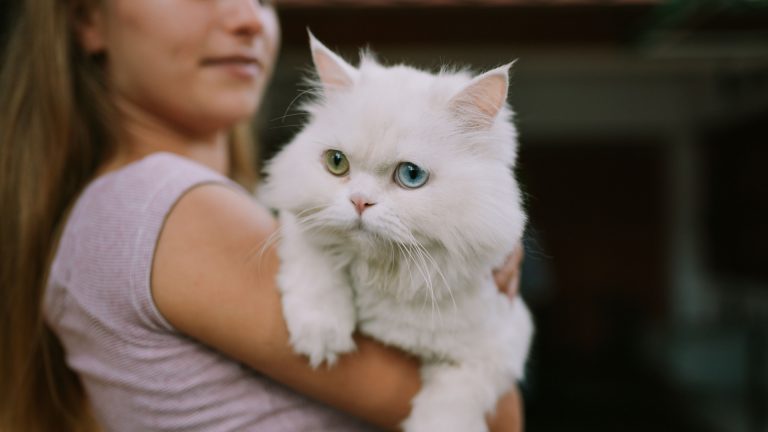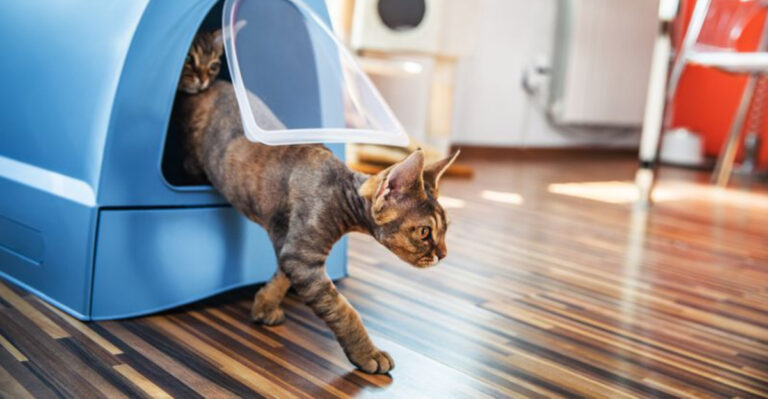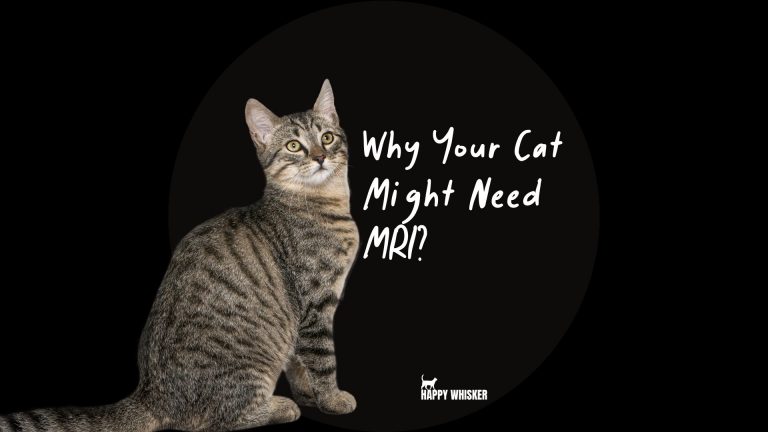When Do Kittens Open Their Eyes? What You Need To Know
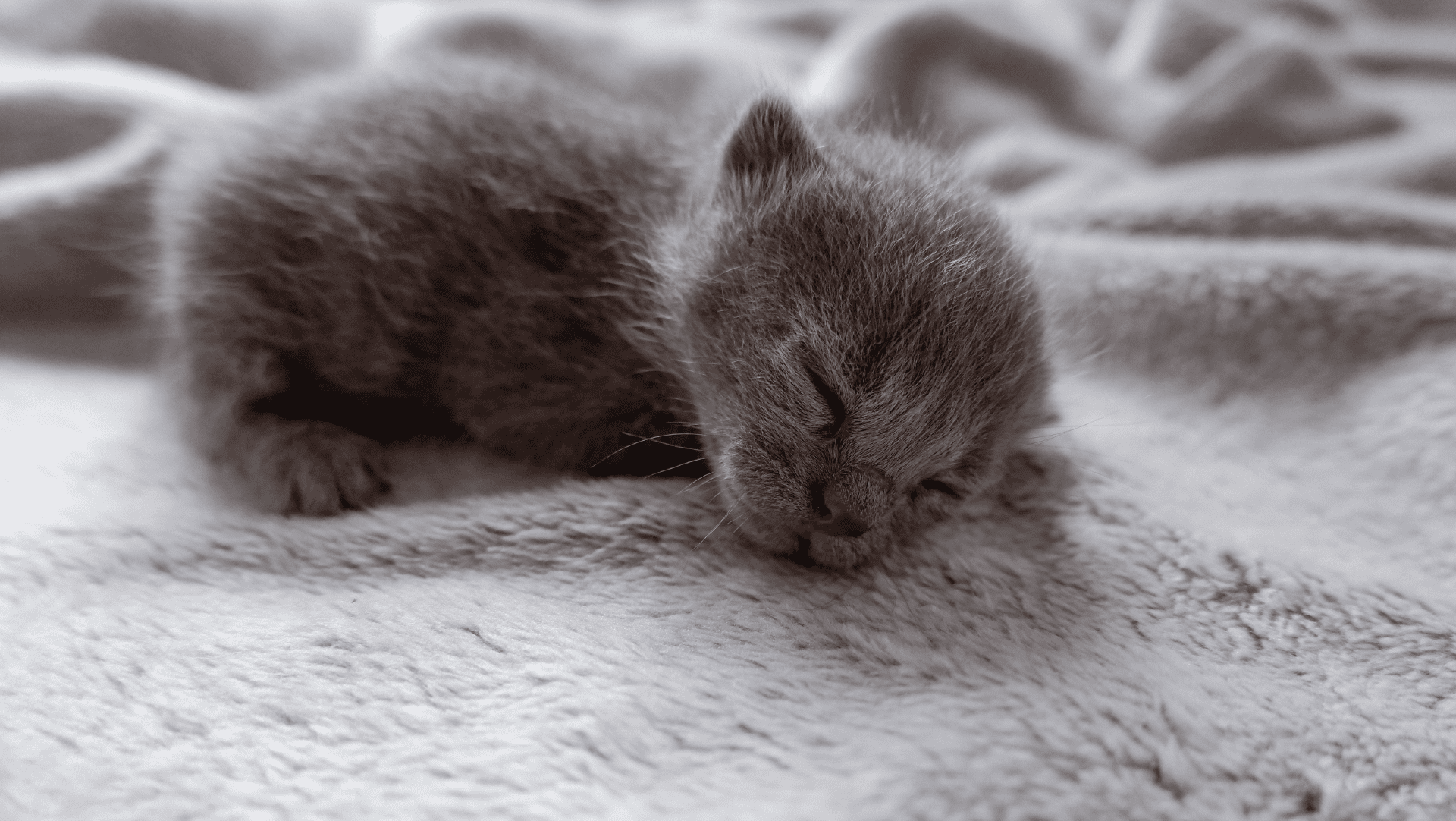
Newborn kittens are very vulnerable creatures requiring special care from their mother cat and owner.
When kittens are born, they’re completely helpless; they cannot hear, see, urinate, or defecate by themselves.
The mother cat is there to direct and properly care for its kittens. If you have a cat that recently gave birth to a litter of kittens, you probably have a lot of questions.
The most frequent question I get is: when do kittens open their eyes?
If you want to know more about the kittens’ eyes and how to care for them properly, keep reading, as you’ll find a lot of beneficial information on how to have healthy little kittens.
When Do Kittens Open Their Eyes?
When kittens are born, they’re completely deaf and blind; therefore, they can’t do much without special help from their mother or you, their owner.
So, when do kittens open their eyes? That may depend on different things, but many newborn kittens open their eyes within 15 days.
However, that’s not all. When kittens open their eyes for the first time, they cannot see everything as they only start developing eyes.
Their eyes will be blue, but very rarely do they keep that blue eye color. Usually, as they grow, the kitten’s eye color changes, and around 8 weeks of age, you’ll get to know the actual color of their eyes.
The period of the kittens’ vision development is crucial because kittens’ eyes are very sensitive. Because of that, special eye care is crucial so that your kittens will eventually have healthy eyes and great vision.
So, if you wish to learn more, keep reading and see how the kittens’ vision develops as they grow.
The Development Of The Kittens’ Vision
You may be surprised at how tiny and vulnerable newborn kittens are, but they grow so fast, especially if they’re taken good care of.
With proper care and good health care, your kitten will be playing around you in the blink of an eye. Until then, it’s essential to provide the kittens with good care, especially until their vision fully develops.
So, keep reading and pay attention to how a kitten’s vision develops during their growth.
1 Week Old Kittens
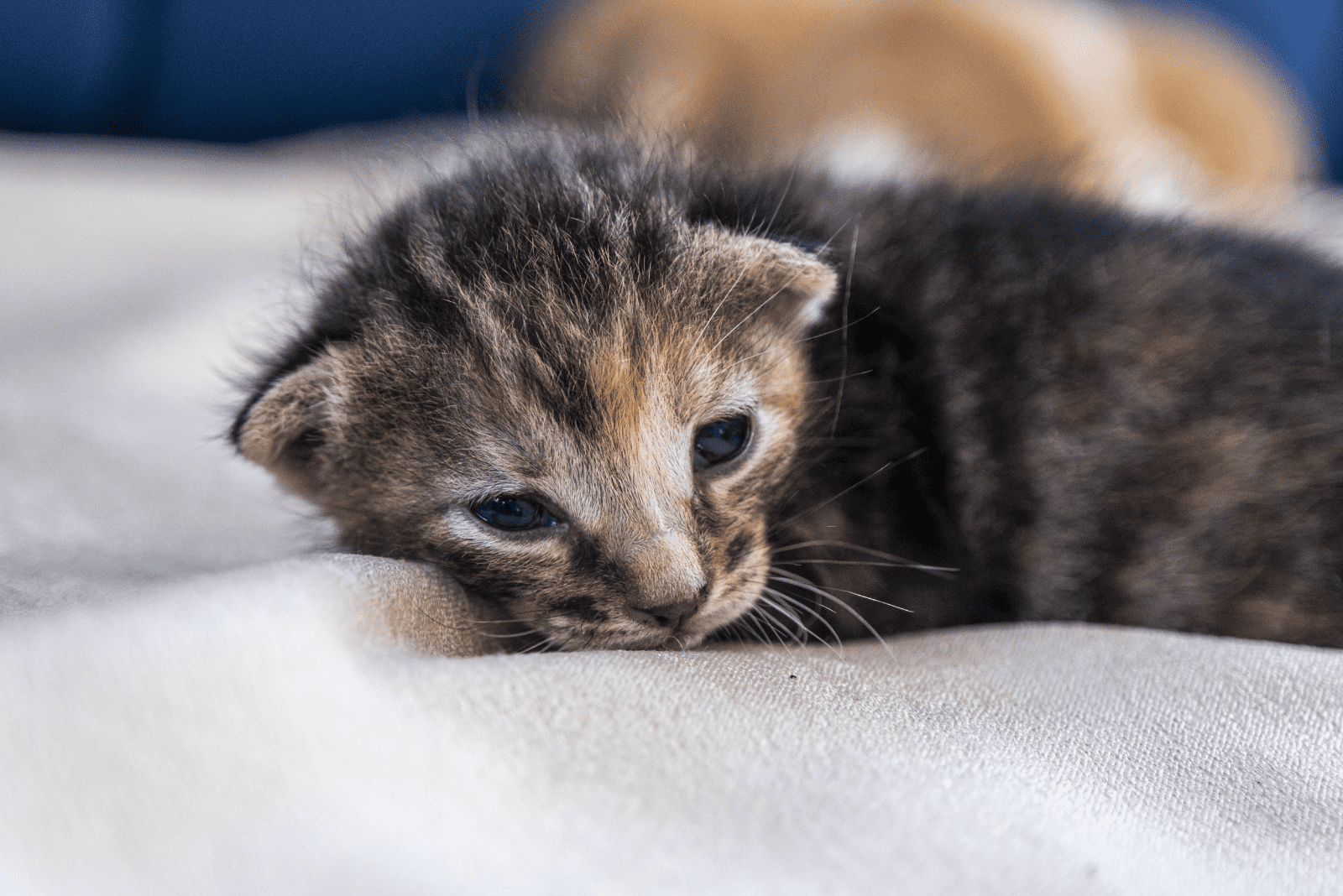
Most newborn kittens open their eyes the first week of age. However, that depends on the individual cat as some kittens may open their eyes earlier and some later.
However, when kittens open their eyes for the first time, they cannot see clearly as their vision still needs to improve a lot. Their eyes will be blue in color, but very rarely do they keep that eye color.
2 Weeks Old Kittens
This is the period when kittens open their eyes fully. Their eyes will still be blue, and their vision will still be blurred.
That’s because their pupils haven’t dilated yet. Because of that, it’s essential to keep the kittens warm and away from bright lights in order not to damage their sensitive eyes.
However, some kittens have their pupils already dilated when they reach 2 weeks of age.
Besides the eyes, a significant improvement can be seen during this week of the kitten’s age because the kitten may also start to open their ear canals, and sense certain smells.
3 Weeks Old Kittens
During the third week of a kittens’ age, their vision improves a lot. Most kittens are able to focus with both eyes at this time.
Ensure the kittens’ eyes are clean to prevent eye infection from arising, especially if you have an orphaned kitten. With or without a mother cat, you can take the kittens to the vet for a preventive check-up.
4 Weeks Old Kittens
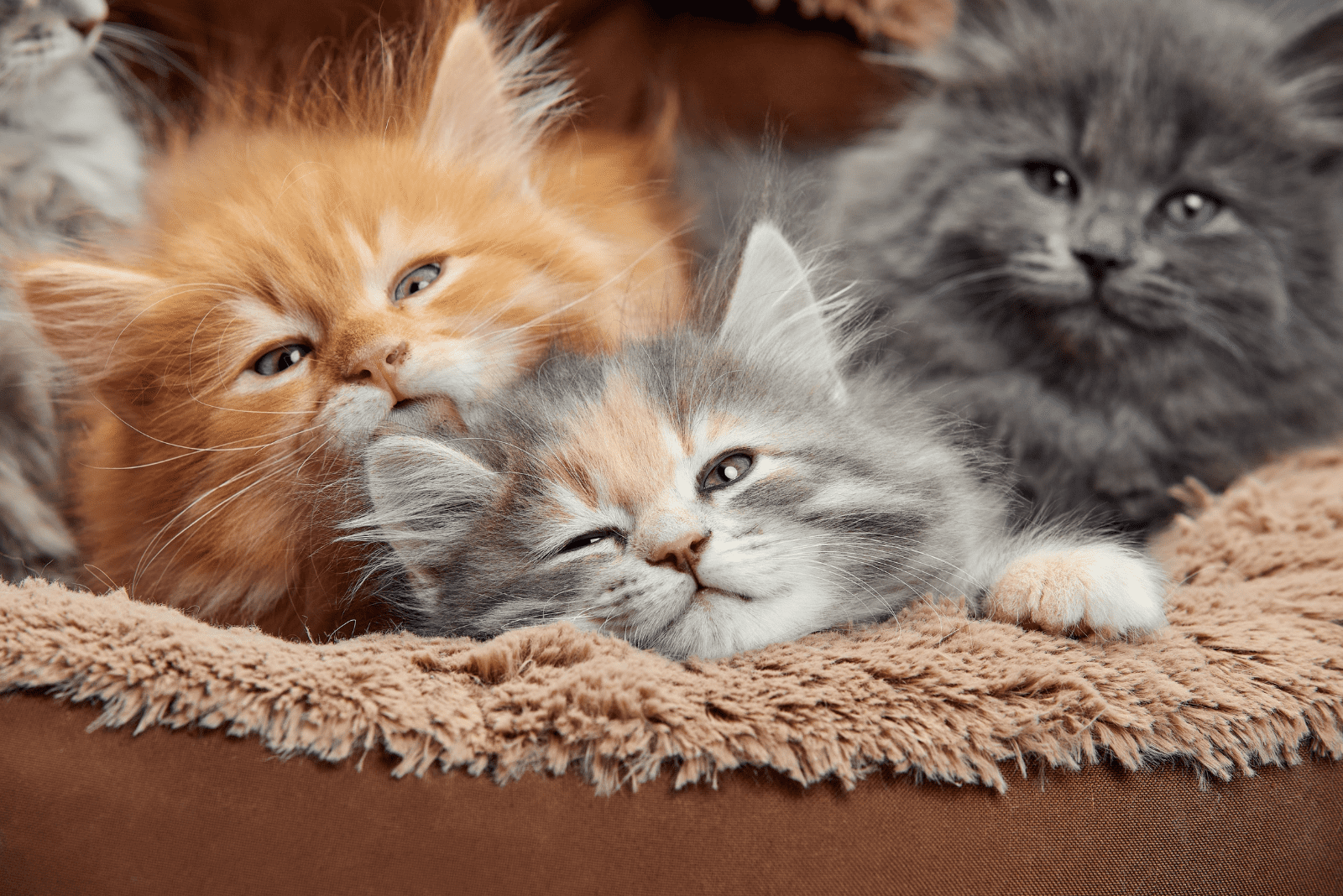
When kittens reach 4 weeks of age, you can easily notice how fully developed they are. Their eye perception is incredibly developed, as well as their sense of smell.
Moreover, during this period, you can notice baby teeth and how they learn to walk and interact with their littermates.
5 Weeks Old Kittens
This period means playful kittens. They start walking, they have teeth that may hurt or itch them, and most importantly, their eyes are fully developed. So, with all that progress, if your kittens are healthy, they’ll play all the time, explore the area and unfamiliar things.
6 Weeks Old Kittens
At 6 weeks of age, the kittens are still growing and their vision is still developing as well as hearing, and everything else. Their eyes will still be blue and not fully developed, but their vision will be much better than before, which is completely normal.
7 Weeks Old Kittens
During this period, the kittens’ eyes may slowly start changing color, unless it’s a breed that is characteristic for their blue eyes, such as ragdolls for example.
Moreover, their vision has improved even more. The kittens can control the amount of light they need, and can see in the dark, but only in dim light, not complete darkness.
8 Weeks Old Kittens
Finally, their vision is completely developed when kittens reach 8 weeks of age. Their eyes aren’t as sensitive as before, and they are able to dilate their pupils completely.
Because of that, the 8 weeks old kittens are able to move in the dark; however, it shouldn’t be completely dark, but rather with a dim lamp.
Also, during this period, kittens develop their adult eye color. Very rarely do cats keep their blue eye color, because there aren’t a lot of cat breeds with blue eyes.
Also, find out if kittens can drink water!
Caring For Kittens’ Eyes
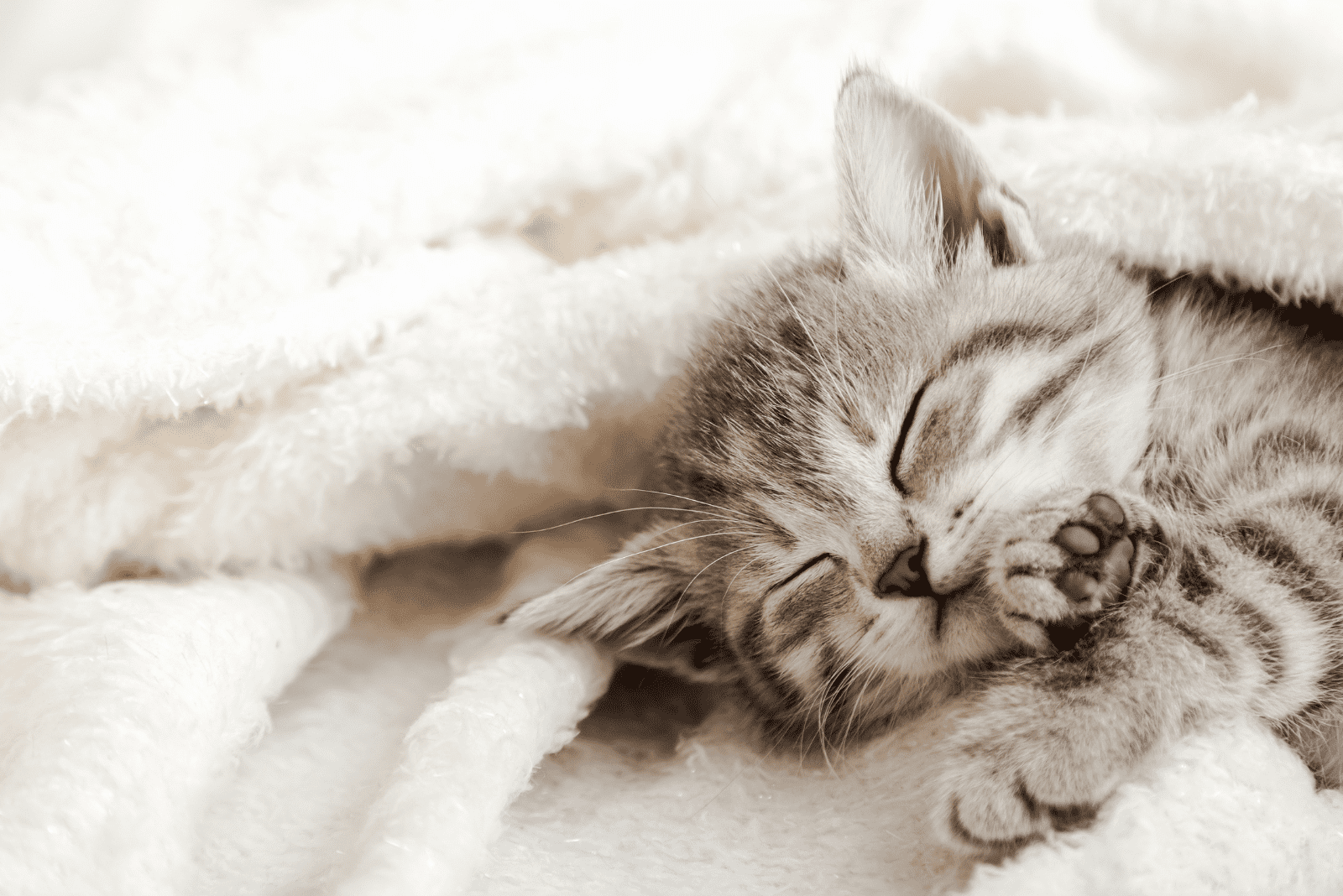
Usually, the following things are done by a mother cat, however, if you took in an orphaned kitten, you’ll have to do everything instead of its mother, including proper eye care.
So, keep reading and find out what you can do to keep your kittens’ eyes healthy.
Keep The Kittens Warm
Newborn kittens cannot control their body temperature, for that reason they need to be kept warm all the time.
Usually, a mother cat keeps her own kittens warm and clean by grooming them. But, if you have an orphaned kitten, that’s all up to you.
If the kittens are kept in too hot or too cold places, that may trigger different health issues, including eye problems. So, it’s important to pay attention to that.
It would be best to provide the kitten with a pet carrier where you’ll put a cat bed or blanket that will keep the kitten warm.
You can also add some sort of heating source, such as a heating pad that always turns out to be more effective. Just make sure that the area temperature is at 29ºC or 85ºF.
Keep The Kittens Away From Bright Lights
When kittens open their eyes, they’re light-colored and extremely sensitive as their vision isn’t entirely developed.
So, until their vision fully develops, it’s crucial to avoid exposing the kittens to bright lights as that can damage their sensitive eyes.
That’s an important thing, especially during the first 2 or 3 weeks, because that’s the period when kittens’ eyes only start to dilate, meaning that they’re able to control the amount of light they receive.
That is why a mother cat always gives birth to her babies in hidden dark spots. So, as a responsible cat parent, you should protect the kittens and their eyes so that you wouldn’t expose them to damage.
Keep The Kittens’ Eyes Clean
As already mentioned, newborn kittens’ eyes are extremely sensitive and prone to different infections and other issues if not taken good care of.
A mother cat grooms and cleans her kittens by licking them, and by doing that, she also cleans their eyes and keeps them clean and healthy.
So, that may be a problem if you have an orphaned kitten, and if you don’t do anything, the kitten may easily develop certain infections or other eye issues.
If you want your kitten to be healthy and have great vision, then you should mimic the mother cat. You can do that by using a warm, clean cotton ball or a washcloth and cleaning its eyes and face.
You may also be interested in when do kittens start to poop!
What Issues Can Kittens’ Eyes Experience And How To Treat Them?
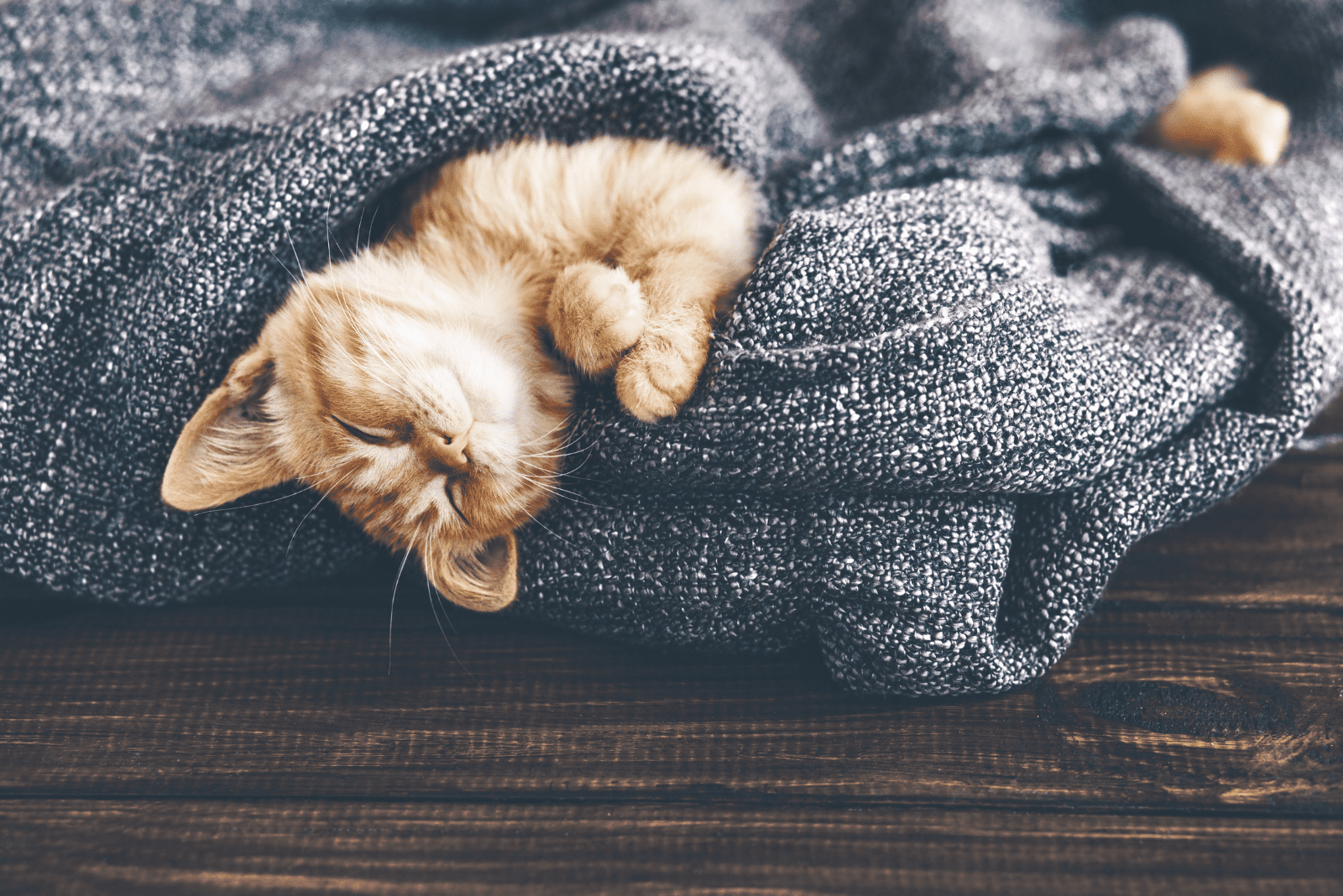
Pay special attention to your newborn kitten’s eyes so they can develop their vision properly, and never force the kitten’s eyes open.
A kitten’s healthy eyes should have a moist, glistening surface, without any discharge, and they should be normally wide open.
When their pupils start to dilate, they should be round in dim light or dark and vertical if they’re exposed to bright lights. However, if you notice anything besides this, that means that your kitten may have certain eye problems.
The following symptoms usually point to different eye problems that need proper care, treatment, or even professional vet help. The symptoms that may appear in such situations are:
• Squinting
• Itchy and red eyes
• Closed eyes
• Excessive blinking
• Pawing at eyes
These symptoms usually point to some of the following eye issues, so check them out and also learn how to treat these conditions properly!
Bacterial And Viral Infections
If you notice that your kitten’s eyes start to develop a crust, that may be a sign of different bacterial and viral infections.
The crust developed on their eyes usually prevents them from opening their eyes. These issues may vary from mild to severe.
As soon as you notice the development of the crust on the kittens’ eyes, you should act so that the eyes wouldn’t be closed completely, as then it’s harder to treat an infection.
Because of that, it’s highly important to keep the kittens’ eyes clean to prevent similar infections from happening.
Moreover, as soon as you notice one kitten with matted crust on its eyes, you need to act immediately so that the infection doesn’t affect its littermates.
Treatment
When you first notice a matted crust on your kittens’ eyes, and if you think that the condition is not severe, you can try cleaning the eyes with warm water and a clean cotton ball or washcloth.
However, if that doesn’t help, the kitten probably has a severe infection that requires immediate vet care.
After the vet examines the kitten, he’ll gently open the kitten’s eyes, clean them and apply the necessary medication.
Further on, the vet will probably prescribe you an antibiotic ointment to treat your kittens’ eyes.
Additionally, he may recommend you to treat the other kittens the same way, if you have any, to prevent the infection from developing if other kittens were in contact with the infected one.
Conjunctivitis
An issue that is very common in cats and kittens is called conjunctivitis. This issue may affect either one or both kittens’ eyes as well as the cat’s third eyelid.
Conjunctivitis causes the inflammation of the conjunctiva that provides the eyeball with lubrication. The common symptoms of conjunctivitis are:
• Squinting
• Red eyes
• Swollen eyes
• Excessive blinking.
Moreover, this condition may be infectious or non-infectious; therefore, it’s important to determine the type of the condition so that it can be treated properly.
Treatment
The treatment of this condition usually depends on the type of conjunctivitis. In most cases, conjunctivitis heals on its own, but I suggest you provide the kittens with professional vet care.
Eye Discharge
A thin layer of tears lubricates a kitten’s eyes, and any extra fluid drains down the tear ducts.
When there is not enough drainage of the tears, eye discharge, or epiphora happens. It is not an illness but a symptom of another problem.
The possible symptoms of eye discharge include:
• Watery eyes
• Red and itchy eyes
• Swollen eyes
• Crusts around the eyes
• Loss of hair around eyes
As soon as you notice some of these symptoms, you may conclude that your kitty has certain eye issues.
Therefore, it’s important to take the kitten for a vet-check so that the veterinarian may examine the kitten and treat it after determining the underlying cause of this issue.
Treatment
Before treating the kitten’s eyes, the vet must determine the underlying cause for this condition so that he can treat it properly. However, eye discharge may appear due to many other eye issues, such as:
• Allergies
• Conjunctivitis
• Uveitis
• Congenital disease
• Eye infections
• Ulcers
So, the treatment will depend on the exact cause of the eye discharge.
You may also want to find out what is the size of a 4-month-old kitten!
Additional Tips For Newborn Kittens
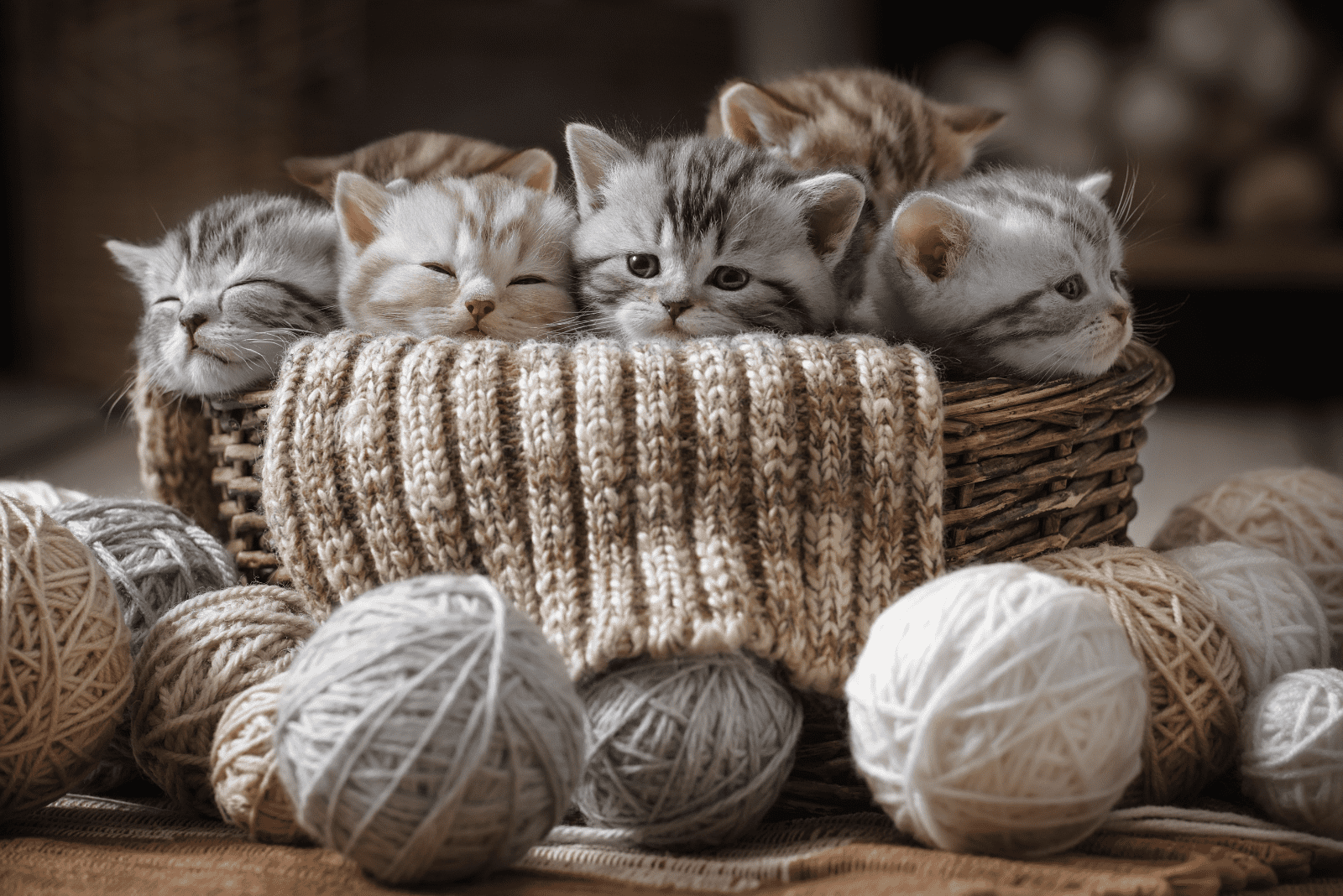
If you have recently become a pet parent to a new kitten, here are some tips I suggest you follow if you want to take good care of your furball baby!
Kittens Need Proper Sleeping Schedule
Just like human babies, baby kittens sleep a lot, while that’s not the case with adult cats.
Newborn kittens are blind and deaf, they cannot move by themselves, they only nurse on their mother and sleep approximately 22 hours a day.
So, if you have a litter of kittens in your home, ensure you adjust one corner of your house just for them. It would be best to provide them with a dark, calm, and most importantly, quiet room where they cannot be disturbed.
Kittens Need A Proper Diet And Feeding Schedule
Kittens need a proper diet and feeding schedule because they’re small and vulnerable, so they need to eat or to be bottle-fed often. Kittens cannot go long without the kitten food because their immune system cannot handle it.
If you have a cat and a litter of kittens, you shouldn’t worry about them while they’re under their mother’s care. However, in that case, you need to provide a mother cat with nutritious food that will give her the strength to raise the kittens.
If you have an orphaned kitten, then make sure you bottle feed the kitten with a special kitten formula, every 2-4 hours.
It’s very important to use kitten milk replacement only. Don’t use cow’s milk or other types as it can cause them digestive problems as they’re lactose intolerant.
If you’re taking care of a very young kitten for the first time, then you can consult with your vet on how to take care of it properly and to help you create a proper feeding schedule.
Kittens Need Regular Vet-Checks
If you want to have healthy kittens, then regular vet-checks are inevitable. You don’t have to wait for a certain health issue to happen to take the kitten to the vet. You can also do it preventively.
So, ensure your kitten is frequently examined, that it receives necessary vaccinations and that it is dewormed. With regular vet-checks, your vet may detect an issue at an early stage that will be much easier to treat.
FAQ
What Happens If A Kitten Opens Its Eyes Too Early?
Kittens are born blind, but when they open their eyes, their vision is still sensitive and not entirely developed.
Some kittens open their eyes earlier and some later in life, but if the kitten opens its eyes too early, when just a few days old, that can negatively influence the kitten’s vision.
Their eyes can be permanently damaged; therefore, keeping the kittens in a room with low light is essential to avoid such things from happening.
In Conclusion
If you want to be a perfect and responsible cat parent, this article provides you with everything you should know about a kitten’s eyes health and kitten care in general.
So, when do kittens open their eyes? Kittens are born completely blind and deaf; therefore, they’re helpless.
They start opening their eyes around the first two week milestone. However, that’s only the beginning of the development of the kitten’s vision.
With proper care, a kitten’s vision gradually improves, and finally, when they reach 8 weeks of age, their vision is completely developed and their eye color is determined.
Kittens’ eyes are very sensitive during their development, so they need special care. It would be best to be aware of the possible eye issues that may affect the kittens and to take them to regular vet-checks to ensure that they’re perfectly healthy.
If you do everything as you should, not only will you be calm and satisfied, but your furry friend will also be happy and thankful for everything, showing you their loyalty for many years.
Like this post? Share or pin it for later!





